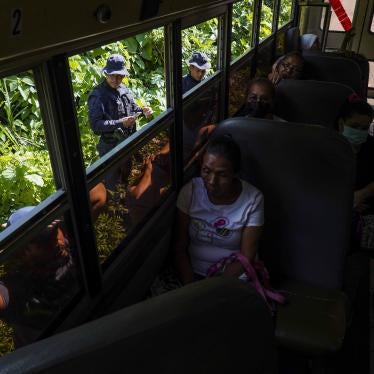I am honored to appear before the Tom Lantos Human Rights Commission.
Organized crime and gangs have a dramatic impact on human rights in Latin America and the Caribbean. The United Nations Office on Drug and Crime (UNODC) reports that the Americas has the highest homicide rate in the world, with 15 homicides per 100,000 people in 2021, and approximately 50 percent of those homicides are linked to organized crime and gangs.
While some countries like Venezuela and Honduras have reported rates of over 30 homicides per 100,000 people, a number of large countries in the region, including Brazil, Mexico, and Colombia, have rates between 20 and 30.
For example, gangs in Ecuador have fueled a dramatic increase in violence, with the homicide rate probably surpassing the 40 per 100,000 people this year, extortion at a historic high, and attacks with explosives, prison massacres, and killings of prosecutors, judges, and political candidates.
And even more worryingly, in Haiti, gangs controlling parts of the country, including the majority of Port-au-Prince, engage in high levels of killings, kidnappings, and sexual violence.
Leaders in the region have struggled to come up with a rights-respecting and effective response. Colombian President Gustavo Petro, who is implementing a “total peace strategy,” has failed to carry out a clear security policy in the ground. Homicides, including those of social leaders, remain high, and kidnappings and child recruitment have increased.
President Andres Manuel Lopez Obrador in Mexico has publicized a “hugs, no bullets” slogan, while increasing militarization of police forces and all aspects of government, reducing funds for local police, and failing to reduce cartel violence.
I will focus particularly on the situation in El Salvador.
Gangs, including MS-13 and Barrio 18, have for decades tormented communities in El Salvador, using brutal violence, including killings and rape, to extort people and gain control over the territory.
The response by past governments typically oscillated between two failed strategies: secret pacts with gangs and iron fist security policies that led to rights violations and new cycles of violence.
President Nayib Bukele has combined both measures. As the US Department of Justice has determined, his government entered into off-the-books arrangements with gangs, offering MS-13 gang leaders’ prison and judicial benefits, including protection from extradition to the United States, in exchange for a decrease in the homicide rate and electoral support.
But after a wave of murders in March 2022, the government announced a “war against gangs,” and the Legislative Assembly, controlled by President Bukele’s allies, declared a state of emergency suspending some constitutional rights.
Twenty-one months later, the state of emergency remains in force. Since it was first established, police and soldiers have arrested more than 73,000 people—roughly 1.6 per cent of the country’s population. These include at least 2,800 children under age 18.
The Legislative Assembly has also approved a series of measures proposed by President Bukele to address gang violence that allow judges to imprison children as young as 12, and dangerously expand the use of pretrial detention and counterterrorism legislation. More recently, in July, it passed a law that, according to the Minister of Justice and lawmakers, would allow courts to try up to 900 people jointly without presenting individual evidence against each of them.
Human Rights Watch has documented widespread human rights violations committed during the state of emergency, including arbitrary arrests, enforced disappearances, torture and other ill-treatment of detainees, and mass due process violations. Hundreds of people detained have no apparent connection to gangs’ abusive activity.
We continue to document similar cases of abuses, including arbitrary detention, due process violations, ill-treatment and, in some cases, torture of children.
Homicides, which have been decreasing since 2015, have fallen further, with official figures indicating a rate of 7.8 homicides per 100,000 people in 2022—and even lower in 2023. Although changes in the ways killings are counted and reports of data manipulation make it harder to estimate the true extent of the reduction, the number of killings and extortion in the country, once among the highest in the world, have sharply diminished. Gangs appear to have been significantly weakened.
However, there are serious reasons to question the sustainability of President Bukele’s security measures. El Salvador lacks the judicial and prison capacity—even with the construction of a massive detention facility for 40,000 detainees— to adjudicate the cases concerning such number of detainees, ensure justice for victims, guarantee due process, and sustainably control prisons. In fact, to date, only a handful of the adults detained during the state of emergency appear to have been sentenced.
Worryingly, governments across the region, including in Ecuador, Honduras, and Peru, have also declared “states of emergency” to respond to violence and crime and many officials and candidates have replicated President Bukele’s public messaging, even if they have not carried out similar policies in the ground.
Much on the contrary, sustainably addressing organized crime and gang violence in Latin America and the Caribbean demands bolstering judicial capacity to conduct strategic criminal prosecutions focused on violent abuses, particularly those committed by senior gang members or chronic abusers, and severing their networks of finance, political support, and weapons supply. It also requires addressing the root causes of criminality, including youth unemployment and high levels of inequality and social exclusion.
Latin America and the Caribbean is not only the region with the highest homicide rate in the world. It is also the region with the greatest number of unpunished homicides. Strengthening the judicial systems to properly investigate these crimes will be key to protecting the rights threatened by organized crime and gangs.








